新概念英语第二册第79课-By air
新概念英语第二册lessonLesson79Byair-2023年学习资料

New words-·Parent n.父母亲-·亲生父母-birth parent-·养父母 foster parent-·单亲父母-single parent-•结婚后他仍和父母住在一起 -.After marriage he still lived with his parent .-•她的父母替她照看孩子。-.Her parents took care of the ba y for her.-•我的父母曾经住在南美洲,所以假期里我常从欧洲乘飞机到他-们那里-.My parents used to live in South America and I use to fly there-from Europe in the holidays.
Lesson 79-By air
·和飞机有关的短语和词汇-乘飞机-by air-空中乘务员-flight attendant机起飞-take off-飞机降落-land landing-飞机上升-gain height 飞机下降-descend-飞机着陆-touch down landed-上飞机-get on he plane-下飞机-get off the plane-在飞机上-on board-国内 航空-domestic/international-非直航-direct/indirect-定 取消/错过航班-book/cancel/miss the
·Be frightened of sth-习惯性的害怕-·他害怕打雷-He is frigh ened of thunder.-Be frightened to do sth-害怕做某事她害怕在黑暗中看到人影-She is frightened to see a figure i the dark.-·她害怕黑暗中可能有鬼-She was frightened that here might be a ghost in the dark.-。-frightenin adj.令人恐惧的-It was a very frightening experience and they were very courageous.-那是一次非常令人恐惧的经历,但他 非常勇敢。-0-frighten vt.使惊恐vi.害怕-He knew that Soli as trying to frighten him,so he smiled to hide is fear.-他知道索利想吓唬他,因此微笑着掩饰自己的恐惧。-Don't put your prices too high or you'll frighten the customer off.-要价别太高,否则os-Check-in desk-check your tic et-pay foree-XINHUA-check your passport-passpor control-give you a boarding card-.5T78,0阳中国收聚热 -中事人民养和国-中南人钢-CAAC-中华人民兴和国-照-批表路沸-登机牌boarding c rd-长号凡.拉等-通行证-251
(完整word版)裕兴新概念英语第二册笔记第79课
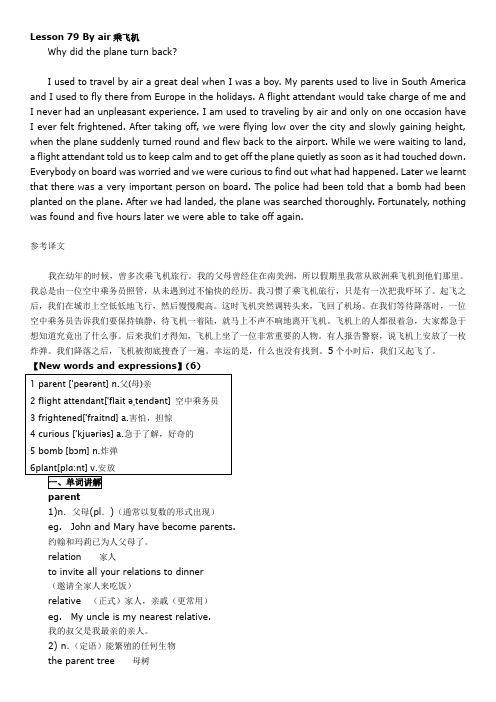
Lesson 79 By air乘飞机Why did the plane turn back?I used to travel by air a great deal when I was a boy. My parents used to live in South America and I used to fly there from Europe in the holidays. A flight attendant would take charge of me and I never had an unpleasant experience. I am used to traveling by air and only on one occasion have I ever felt frightened. After taking off, we were flying low over the city and slowly gaining height, when the plane suddenly turned round and flew back to the airport. While we were waiting to land, a flight attendant told us to keep calm and to get off the plane quietly as soon as it had touched down. Everybody on board was worried and we were curious to find out what had happened. Later we learnt that there was a very important person on board. The police had been told that a bomb had been planted on the plane. After we had landed, the plane was searched thoroughly. Fortunately, nothing was found and five hours later we were able to take off again.参考译文我在幼年的时候,曾多次乘飞机旅行。
新概念英语第二册逐句精讲语言点第79课(3)

新概念英语第二册逐句精讲语言点第79课(3)Lesson 79 By air 乘飞机I used to travel by air a great deal when I was a boy. My parents used to live in South America and I used to fly there from Europe in the holidays. A flight attendant would take charge of me and I never had an unpleasant experience. I am used to travelling by air and only on one occasion have I ever felt frightened. After taking off, we were flying low over the city and slowly gaining height, when the plane suddenly turned round and flew back to the airport. While we were waiting to land, a flight attendant told us to keep calm and to get off the plane quietly as soon as it had touched down. Everybody on board was worried and we were curious to find out what had happened. Later we learnt that there was a very important person on board. The police had been told that a bomb had been planted on the plane. After we had landed, the plane was searched thoroughly. Fortunately, nothing was found and five hours later we were able to take off again.句子讲解:8、Later we learnt that there was a very important person on board.后来我们才得知,飞机上坐了一位非常重要的人物。
新概念2_lesson_79_By_air
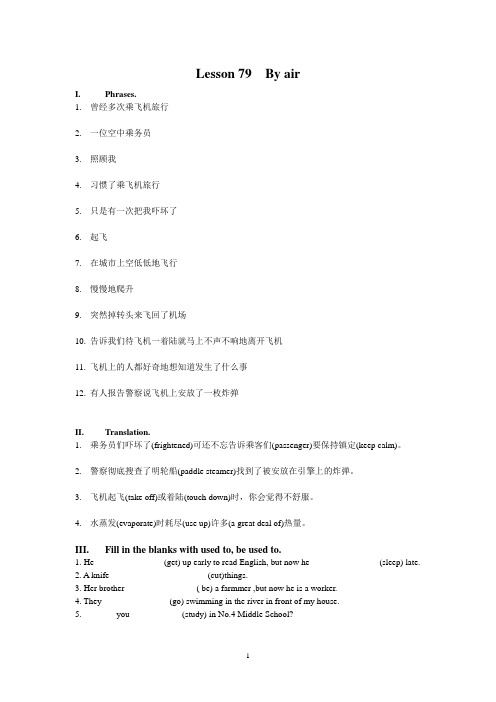
Lesson 79 By airI.Phrases.1.曾经多次乘飞机旅行_____________________________________________________________________2.一位空中乘务员_____________________________________________________________________3.照顾我_____________________________________________________________________4.习惯了乘飞机旅行_____________________________________________________________________5.只是有一次把我吓坏了_____________________________________________________________________6.起飞_____________________________________________________________________7.在城市上空低低地飞行_____________________________________________________________________8.慢慢地爬升_____________________________________________________________________9.突然掉转头来飞回了机场_____________________________________________________________________10.告诉我们待飞机一着陆就马上不声不响地离开飞机_____________________________________________________________________11.飞机上的人都好奇地想知道发生了什么事_____________________________________________________________________12.有人报告警察说飞机上安放了一枚炸弹_____________________________________________________________________II.Translation.1.乘务员们吓坏了(frightened)可还不忘告诉乘客们(passenger)要保持镇定(keep calm)。
新概念第二册79 By air 乘飞机

Lesson79 By air 乘飞机课文单词:1.parent ['peərənt] n.父(母)亲2 flight attendant['flait əˌtendənt] 空中乘务员3 frightened['fraitnd] a.害怕,担惊4 curious ['kjuəriəs] a.急于了解,好奇的5 bomb [bɔm] n.炸弹6plant[plɑ:nt] v.安放词组:1.flight attendant['flait əˌtendənt] 空中乘务员2.take charge (of)…照顾……,接管,开始管理3.be used to doing sth. 习惯于做某事4.take off 起飞5.gain height (飞机)增加高度,爬高(gain vt. 增加)6.gain some weight:胖了一些7.touch down (飞机)着陆,降落8.on board 在……(如飞机)上,搭乘(船、飞机、火车、汽车等)练习:单词:1. 空中乘务员2. a.害怕,担惊3. a.急于了解,好奇的4. n.炸弹5. v.安放词组:1. 空中乘务员2. 照顾……,接管,开始管理3. 习惯于做某事4. 起飞5.(飞机)增加高度,爬高(gain vt. 增加)6.胖了一些7.(飞机)着陆,降落8. 在……(如飞机)上,搭乘(船、飞机、火车、汽车等)句子:1.He was f________ at the thought of his coming examination.一想到即将来临的考试他就害怕。
2.The f_______ horse ran away from the fire. 受惊的马从火堆里逃跑。
3.I’ve _____ ____ _____ recently, because I don’t have any time to do exercise.没时间锻炼,我最近胖了一些。
新概念第二册Lesson 79 By air讲义

新概念第二册Lesson 79 By air一、单词精讲parent ['peərənt]n.父(母)亲引申:可引申为根源、起源,如“Necessity is the parent of invention.”(需要是发明之母)。
搭配:single parent(单亲);parent company(母公司);parent - child relationship(亲子关系)。
例句:My parents are very strict with me.(我的父母对我非常严格。
)flightattendant['flait əˌtendənt] 空中乘务员引申:可引申为航空服务人员的代表形象,在航空安全宣传等方面作为一种职业标识。
搭配:experienced flight attendant(有经验的空中乘务员);flight attendant uniform(空中乘务员制服)。
例句:The flight attendant served us delicious meals.(空中乘务员为我们提供了美味的餐食。
)词源:“flight”来自古英语“flyht”,表示飞行;“attendant”源自拉丁语“attendere”,意为照顾、侍候,组合起来表示在空中飞行的飞机上照顾乘客的人员。
frightened['fraitnd]a.害怕,担惊引申:可引申为使人惊恐的状态或氛围,如“a frightened silence”(一种惊恐的沉默)。
搭配:be frightened of(害怕……);frightened look(惊恐的表情)。
例句:The little girl was frightened of the dog.(小女孩害怕那只狗。
)词源:“frighten”源自古英语“fyrhto”,表示恐惧,加上- ed表示形容词形式。
curious['kjuəriəs] a.急于了解,好奇的引申:可引申为奇特的、古怪的,如“a curious object”(一个奇特的物体)。
【新概念英语第二册79课答案】新概念英语第二册第79课:By air
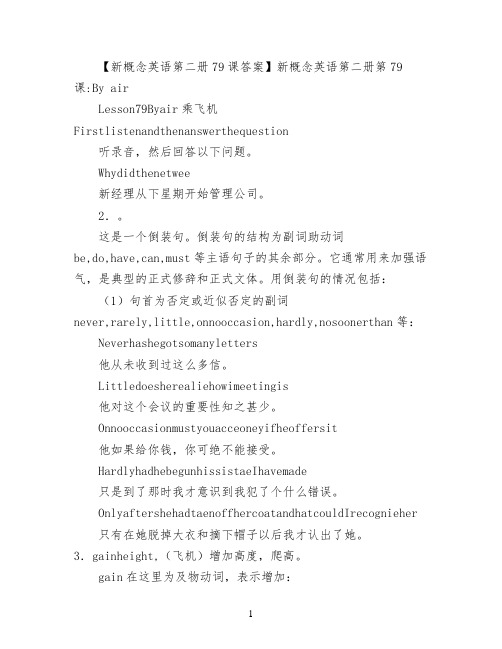
【新概念英语第二册79课答案】新概念英语第二册第79课:By airLesson79Byair乘飞机Firstlistenandthenanswerthequestion听录音,然后回答以下问题。
Whydidthenetwee新经理从下星期开始管理公司。
2.。
这是一个倒装句。
倒装句的结构为副词助动词be,do,have,can,must等主语句子的其余部分。
它通常用来加强语气,是典型的正式修辞和正式文体。
用倒装句的情况包括:(1)句首为否定或近似否定的副词never,rarely,little,onnooccasion,hardly,nosoonerthan等:Neverhashegotsomanyletters他从未收到过这么多信。
Littledoesherealiehowimeetingis他对这个会议的重要性知之甚少。
Onnooccasionmustyouacceoneyifheoffersit他如果给你钱,你可绝不能接受。
HardlyhadhebegunhissistaeIhavemade只是到了那时我才意识到我犯了个什么错误。
OnlyaftershehadtaenoffhercoatandhatcouldIrecognieher 只有在她脱掉大衣和摘下帽子以后我才认出了她。
3.gainheight,(飞机)增加高度,爬高。
gain在这里为及物动词,表示增加:Thecargainedsuchweightthathedecidestogoonadiet他体重增加得太多了,便决定节食。
4.touchdown,(飞机)着陆,降落。
Aftereighthours,thehasneverbeenonboardaanyflowersandv egetables乔在他的花园里种植了许多花卉和蔬菜。
(2)放置,安置;布置:Abombwasanyenwereainstreet那天(城里的)主要街道上部署了许多警察。
新概念英语文本第二册Lesson79
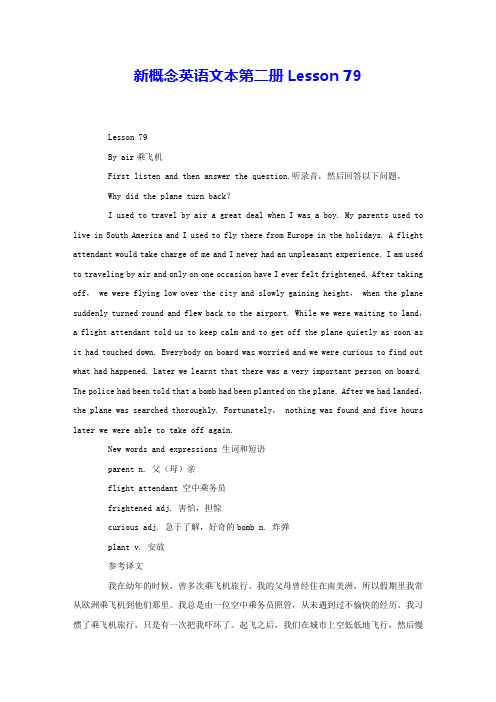
新概念英语文本第二册Lesson 79Lesson 79By air乘飞机First listen and then answer the question.听录音,然后回答以下问题。
Why did the plane turn back?I used to travel by air a great deal when I was a boy. My parents used to live in South America and I used to fly there from Europe in the holidays. A flight attendant would take charge of me and I never had an unpleasant experience. I am used to traveling by air and only on one occasion have I ever felt frightened. After taking off, we were flying low over the city and slowly gaining height, when the plane suddenly turned round and flew back to the airport. While we were waiting to land,a flight attendant told us to keep calm and to get off the plane quietly as soon as it had touched down. Everybody on board was worried and we were curious to find out what had happened. Later we learnt that there was a very important person on board. The police had been told that a bomb had been planted on the plane. After we had landed,the plane was searched thoroughly. Fortunately, nothing was found and five hours later we were able to take off again.New words and expressions 生词和短语parent n. 父(母)亲flight attendant 空中乘务员frightened adj. 害怕,担惊curious adj. 急于了解,好奇的bomb n. 炸弹plant v. 安放参考译文我在幼年的时候,曾多次乘飞机旅行。
裕兴新概念英语第二册笔记 第79课
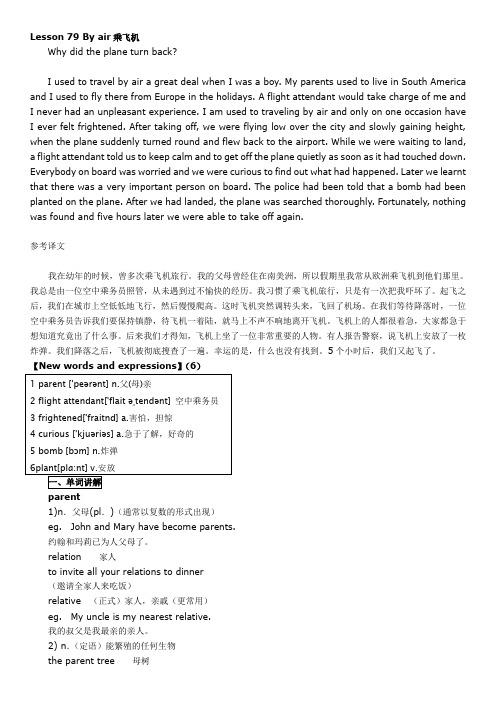
Lesson 79 By air乘飞机Why did the plane turn back?I used to travel by air a great deal when I was a boy. My parents used to live in South America and I used to fly there from Europe in the holidays. A flight attendant would take charge of me and I never had an unpleasant experience. I am used to traveling by air and only on one occasion have I ever felt frightened. After taking off, we were flying low over the city and slowly gaining height, when the plane suddenly turned round and flew back to the airport. While we were waiting to land, a flight attendant told us to keep calm and to get off the plane quietly as soon as it had touched down. Everybody on board was worried and we were curious to find out what had happened. Later we learnt that there was a very important person on board. The police had been told that a bomb had been planted on the plane. After we had landed, the plane was searched thoroughly. Fortunately, nothing was found and five hours later we were able to take off again.参考译文我在幼年的时候,曾多次乘飞机旅行。
新概念英语二册超详教案讲义笔记Lesson79Byair乘飞机
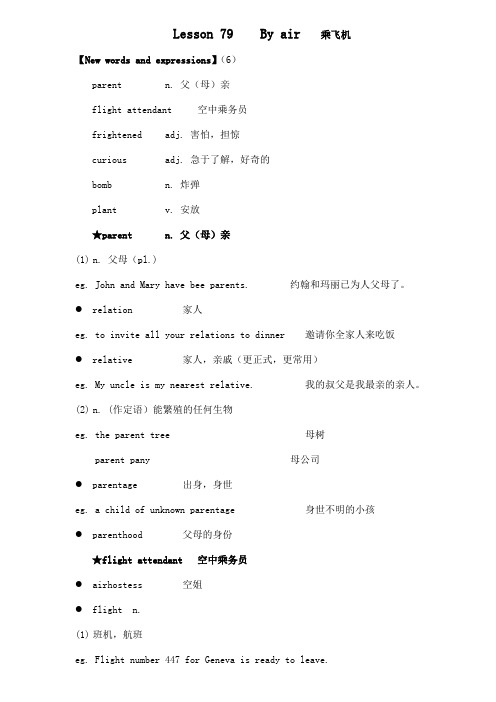
Lesson 79 By air乘飞机【New words and expressions】(6)parent n. 父(母)亲flight attendant 空中乘务员frightened adj. 害怕,担惊curious adj. 急于了解,好奇的bomb n. 炸弹plant v. 安放★parent n. 父(母)亲(1)n. 父母(pl.)eg. John and Mary have bee parents. 约翰和玛丽已为人父母了。
●relation 家人eg. to invite all your relations to dinner 邀请你全家人来吃饭●relative 家人,亲戚(更正式,更常用)eg. My uncle is my nearest relative. 我的叔父是我最亲的亲人。
(2)n. (作定语)能繁殖的任何生物eg. the parent tree 母树parent pany 母公司●parentage 出身,身世eg. a child of unknown parentage 身世不明的小孩●parenthood 父母的身份★flight attendant 空中乘务员●airhostess 空姐●flight n.(1)班机,航班eg. Flight number 447 for Geneva is ready to leave.飞往日内瓦的447 次航班准备出发。
(2)航程,飞行距离eg. a straight flight towards home直航回家(3)航空旅程eg. Did you have a good flight? 你搭乘飞机一路愉快吗?●attendant n. (公共场所照顾游客的)服务员eg. a flight attendant 空中乘务员a museum attendant 博物馆接待员shop assistant (在店里工作的)店员★frightened adj. 害怕,担惊eg. The frightened horse ran away from the fire.受惊的马从大火中逃跑了。
新概念英语第二册笔记新版:第79课

Lesson 79 By air【New words and expressions】(6)parent n. ⽗(母)亲flight attendant 空中乘务员frightened adj. 害怕,担惊curious adj. 急于了解,好奇的bomb n. (zhadan)plant v. 安放★plant v. 安放① vt. 种植;在……内种植They planted grass seed on the desolate hills.② vt. 放置,安置;布置A bomb was planted on the plane.On that day many policemen were planted along the main street.【Text】I used to travel by air a great deal when I was a boy. My parents used to live in South America and I used to fly there from Europe in the holidays. A flight attendant would take charge of me and I never had an unpleasant experience. I am used to traveling by air and only on one occasion have I ever felt frightened. After taking off, we were flying low over the city and slowly gaining height, when the plane suddenly turned round and flew back to the airport. While we were waiting to land, a flight attendant told us to keep calm and to get off the plane quietly as soon as it had touched down. Everybody on board was worried and we were curious to find out what had happened. Later we learnt that there was a very important person on board. The police had been told that a bomb had been planted on the plane. After we had landed, the plane was searched thoroughly. Fortunately, nothing was found and five hours later we were able to take off again.参考译⽂我在幼年的时候,曾多次乘飞机旅⾏。
新概念第二册79课课文原文
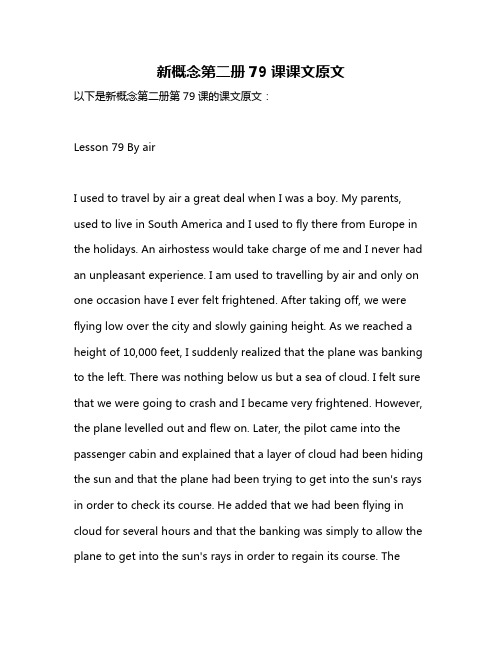
新概念第二册79课课文原文以下是新概念第二册第79课的课文原文:Lesson 79 By airI used to travel by air a great deal when I was a boy. My parents, used to live in South America and I used to fly there from Europe in the holidays. An airhostess would take charge of me and I never had an unpleasant experience. I am used to travelling by air and only on one occasion have I ever felt frightened. After taking off, we were flying low over the city and slowly gaining height. As we reached a height of 10,000 feet, I suddenly realized that the plane was banking to the left. There was nothing below us but a sea of cloud. I felt sure that we were going to crash and I became very frightened. However, the plane levelled out and flew on. Later, the pilot came into the passenger cabin and explained that a layer of cloud had been hiding the sun and that the plane had been trying to get into the sun's rays in order to check its course. He added that we had been flying in cloud for several hours and that the banking was simply to allow the plane to get into the sun's rays in order to regain its course. Thepilot's explanation made me feel much better and I no longer felt afraid. The rest of the flight passed without incident and I arrived at my destination safely. Since then, I have always been happy to travel by air and I have never had any unpleasant experiences.。
新概念二册 第79课 By air(共25张PPT)
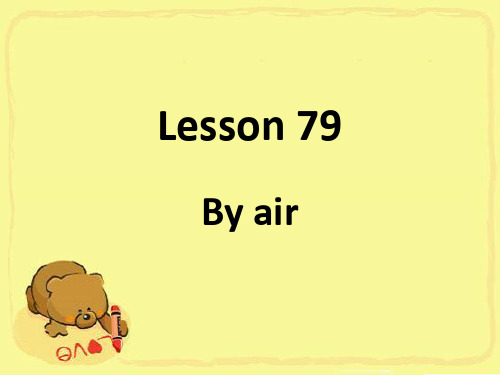
• After taking off, we were flying low over the city and slowly gaining height, when the plane suddenly turned round and flew back to the airport.
• take off 起飞 • gain height (飞机)增加高度,爬高 • 当车出城之后,开始加速
9、 有 时 候 读 书是一 种巧妙 地避开 思考的 方法。 21.8.521.8.5Thursday, August 05, 2021 10、 阅 读 一 切 好书 如同和 过去最 杰出的 人谈话 。20:13:4020:13:4020:138/5/2021 8:13:40 PM
11、 越 是 没 有 本领 的就越 加自命 不凡。 21.8.520:13:4020:13Aug-215-Aug-21 12、 越 是 无 能 的人 ,越喜 欢挑剔 别人的 错儿。 20:13:4020:13:4020:13Thursday, August 05, 2021 13、 知 人 者 智 ,自 知者明 。胜人 者有力 ,自胜 者强。 21.8.521.8.520:13:4020:13:40August 5, 2021 14、 意 志 坚 强 的人 能把世 界放在 手中像 泥块一 样任意 揉捏。 2021年 8月5日 星期四 下午8时 13分40秒 20:13:4021.8.5 15、 最 具 挑 战 性的 挑战莫 过于提 升自我 。。2021年 8月 下午8时 13分 21.8.520:13August 5, 2021 16、 业 余 生 活 要有 意义, 不要越 轨。2021年 8月 5日星 期四8时 13分40秒 20:13:405 August 2021 17、 一 个 人 即 使已 登上顶 峰,也 仍要自 强不息 。下午 8时13分 40秒下 午8时 13分20:13:4021.8.5
新概念二第79课笔记·答案版本(可搭配填空版本进行默写)

Lesson79-By air-倒装句1.n.父/母parent勤奋是成功之母。
Industry is the parent of success.n.亲戚relation/relative2.n.服务员;参与者attendant空中乘务员flight attendantv.出席attend n.出席attendance3.adj.害怕,担惊frightened n.惊吓;恐怖fright adj.令人恐惧的frighteningv.使惊吓;使惊恐frighten adj.惊吓的;害怕的frightened短语:受到惊吓be frightened=get a fright把某人吓跑frighten sb.away吓某人一跳frighten sb.=give sb.a fright对...感到害怕be frightened at...=be afraid of...=be frightened/afraid+(that)从句构词法1:n./adj.+en=v.鼓励en+courage=encourage加强,提高height+en=heighten威胁threat+en=threaten加强strength+en=strengthen削弱weak+en=weaken加深deep+en=deepen使变黑black+en=blacken扣紧fast+en=fasten构词法2:材质n.+en=adj.木制的wood+en=wooden金制的gold+en=golden羊毛制的wool+en=woollen/woolen 4.adj.好奇的curious对...感到好奇be curious about...好奇做某事be curious to do sth.n.好奇心curiosity出于好奇out of curiosity5.v.安放/种植;n.植物plant把某物安放在某地plant sth.+地点副词/介词短语6.(Lesson70)v.要价/指控/负责/冲上去charge因为某个东西收(某人)钱charge(sb.)for sth.向这个醉汉冲去charge at the drunk负责...be in charge of...由...负责be in the charge of...指控某人犯某罪charge sb.with...因...逮捕某人arrest sb.for...照顾...take charge of...=take care of...=look after...7.倒装句定义:谓语的全部或者一部分放在主语前,分为全部倒装和部分倒装用途:表示强调全部倒装:谓语全部放在主语前①结构:全倒标志词+一现/一过谓语+名词主语②标志词: a.方位放句首:副词/介词短语b.时间放句首:副词now/then③限制:主语是名词;动词表示存在/运动;时态是一般现在/过去时部分倒装:谓语一部分放在主语前①结构:部倒标志词+be/情/助+主语+动词②标志词: a.否定副词放句首:no、not、never、seldom、little、hardlyat no time、in no way、by no means、not only、not untilb.only+状语(短语/从句)放句首c.so/so短语放句首d.频率副词/短语放句首常见考点:a....来了。
新概念英语第二册Lesson+79+By+air乘飞机+讲义
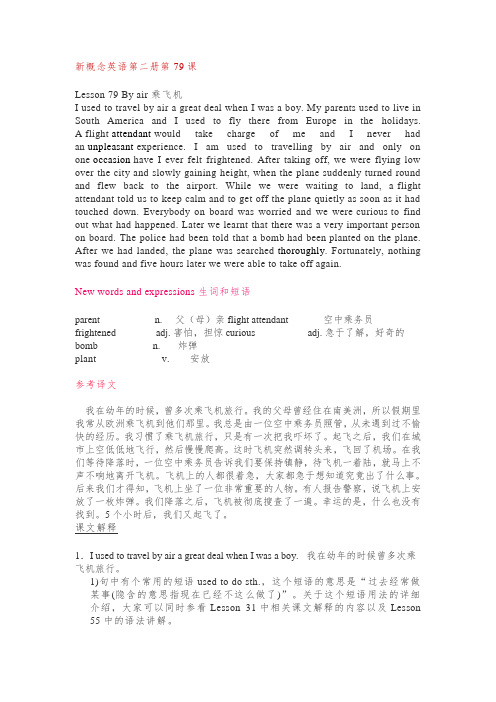
新概念英语第二册第79课Lesson 79 By air 乘飞机I used to travel by air a great deal when I was a boy. My parents used to live in South America and I used to fly there from Europe in the holidays.A flight attendant would take charge of me and I never had an unpleasant experience. I am used to travelling by air and only on one occasion have I ever felt frightened. After taking off, we were flying low over the city and slowly gaining height, when the plane suddenly turned round and flew back to the airport. While we were waiting to land, a flight attendant told us to keep calm and to get off the plane quietly as soon as it had touched down. Everybody on board was worried and we were curious to find out what had happened. Later we learnt that there was a very important person on board. The police had been told that a bomb had been planted on the plane. After we had landed, the plane was searched thoroughly. Fortunately, nothing was found and five hours later we were able to take off again.New words and expressions 生词和短语parent n. 父(母)亲flight attendant 空中乘务员frightened adj. 害怕,担惊curious adj. 急于了解,好奇的bomb n. 炸弹plant v. 安放参考译文我在幼年的时候,曾多次乘飞机旅行。
逐句精讲新概念英语第二册第79课 乘飞机
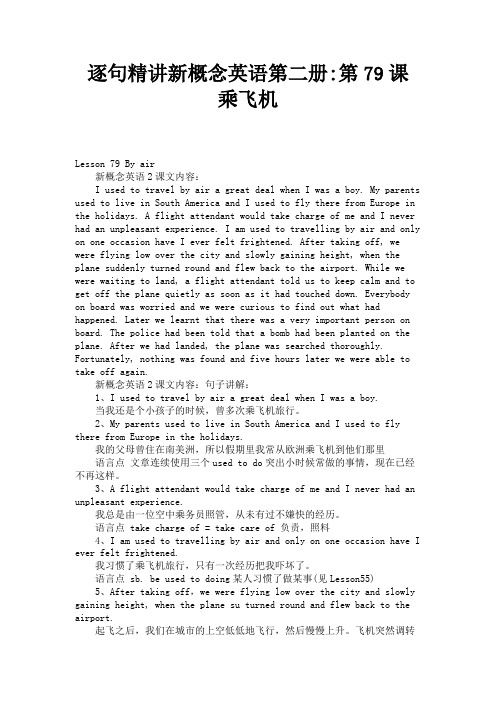
逐句精讲新概念英语第二册:第79课乘飞机Lesson 79 By air新概念英语2课文内容:I used to travel by air a great deal when I was a boy. My parents used to live in South America and I used to fly there from Europe in the holidays. A flight attendant would take charge of me and I never had an unpleasant experience. I am used to travelling by air and only on one occasion have I ever felt frightened. After taking off, we were flying low over the city and slowly gaining height, when the plane suddenly turned round and flew back to the airport. While we were waiting to land, a flight attendant told us to keep calm and to get off the plane quietly as soon as it had touched down. Everybody on board was worried and we were curious to find out what had happened. Later we learnt that there was a very important person on board. The police had been told that a bomb had been planted on the plane. After we had landed, the plane was searched thoroughly. Fortunately, nothing was found and five hours later we were able to take off again.新概念英语2课文内容:句子讲解:1、I used to travel by air a great deal when I was a boy.当我还是个小孩子的时候,曾多次乘飞机旅行。
新概念英语第二册逐句精讲语言点第79课(2)
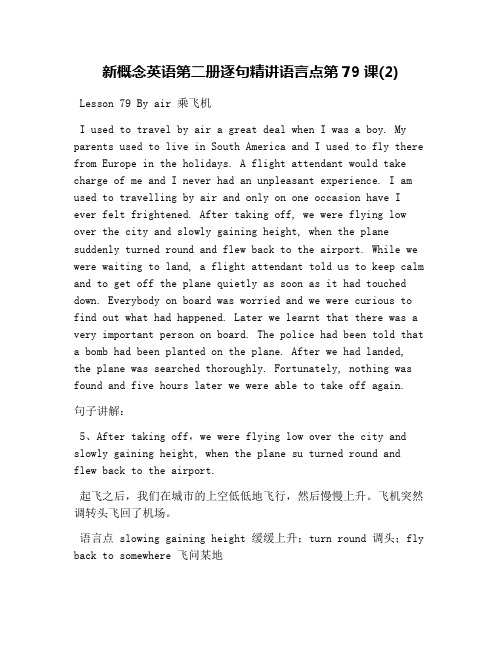
新概念英语第二册逐句精讲语言点第79课(2)Lesson 79 By air 乘飞机I used to travel by air a great deal when I was a boy. My parents used to live in South America and I used to fly there from Europe in the holidays. A flight attendant would take charge of me and I never had an unpleasant experience. I am used to travelling by air and only on one occasion have I ever felt frightened. After taking off, we were flying low over the city and slowly gaining height, when the plane suddenly turned round and flew back to the airport. While we were waiting to land, a flight attendant told us to keep calm and to get off the plane quietly as soon as it had touched down. Everybody on board was worried and we were curious to find out what had happened. Later we learnt that there was a very important person on board. The police had been told that a bomb had been planted on the plane. After we had landed, the plane was searched thoroughly. Fortunately, nothing was found and five hours later we were able to take off again.句子讲解:5、After taking off,we were flying low over the city and slowly gaining height, when the plane su turned round and flew back to the airport.起飞之后,我们在城市的上空低低地飞行,然后慢慢上升。
新概念英语第二册Lesson 79 (共65张PPT)

Grammar
Exercise 1
drinking – very little – a lot
A: John has been eating very little recently. B: So I noticed. He used to eat a lot.
Grammar
Exercise 1
New words and expressions
bomb n.
a bomb explodes/goes off 炸弹炸了
New words and expressions
bomb n.
drop a bomb 扔炸弹
New words and expressions
bomb n.
plant a bomb(leave a bomb somewhere) 放置炸弹
New words and expressions
frightened adj.
feeling afraid 害怕,担惊 把原本PPT占上
New words and expressions
be frightened of
翻译句子
I was frightened of being left by myself in the house.
curious adj.
Be less curious about people and more curious about ideas.
Madame Curie
New words and expressions
bomb n.
a weapon made of material that will explode 炸弹
New words and expressions
新概念第二册 Lesson 79 By air

NEW WORDS AND EXPRESSION
parent /ˈpeərənt/ n. 父(母)亲 flight attendant /ˈflaɪt ətendənt/ 空中乘务员 frightened /ˈfraɪtnd/ adj. 害怕,担惊
Hale Waihona Puke curious /ˈkjʊəriəs/ adj. 急于了解,好 奇的
bomb /bɒm/ n. 炸弹 plant /plɑːnt/ v. 安放
PARENT
parent /ˈpeərənt/ n. 父(母)亲 E.g. They are Tom and Nancy’s parents. 他们是汤姆和南希的父母。
FLIGHT ATTENDANT
flight /flaɪt/ n. 航班,飞行 attend /əˈtend/ v. 出席,参加 attendant /əˈtendənt/ n. 服务员 adj. 伴随的 flight attendant /ˈflaɪt ətendənt/ n. 空中乘务员 E.g. A flight attendant would take charge of me and I never had an unpleasant experience. 我总是由一位空中乘务员照管,从未遇到过不愉快的 经历。
over the city and slowly gaining height, when the plane suddenly turned
round and flew back to the airport. While we were waiting to land, a gain height,
flight attendant told us to keep calm and to get off the plane quietly as (飞机) 爬高。
79新概念2第79课(课堂PPT)
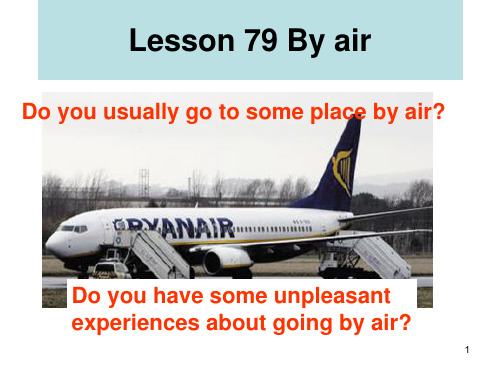
• 4.很抱歉,我在这方面毫无经验。
• I am sorry to say that I _h_a_v_e__n_o__e_x_p_e_ri_e_n_cein this
field.
9
• 1. She told us that she __w_o_u_ld__n(ontogtogo) with us,if it rained.
• touch down (飞机)着陆,降落
• Don’t stand up before the plane has touched down. • 4、Everybody on board was worried and we were
curious to find out what had happened. • on board 在……(如飞机)上,搭乘(船、飞机、火
车、等)
• Tom has never been on board a plane before.
6
Read and answer the questions.
• Where did you parents use to live? • In south America. • When did you used to fly there? • In the holidays. • Who would take charge of you? • A flight attendant would. • Were you once on a plane that flew back to
illness, but she’ll _____b_e__a_b_l_e__to___ catch up with her
lessons quickly.
- 1、下载文档前请自行甄别文档内容的完整性,平台不提供额外的编辑、内容补充、找答案等附加服务。
- 2、"仅部分预览"的文档,不可在线预览部分如存在完整性等问题,可反馈申请退款(可完整预览的文档不适用该条件!)。
- 3、如文档侵犯您的权益,请联系客服反馈,我们会尽快为您处理(人工客服工作时间:9:00-18:30)。
新概念英语第二册第79课:By airLesson 79 By air乘飞机First listen and then answer the question.听录音,然后回答以下问题。
Why did the plane turn back?I used to travel by air a great deal when I was a boy. My parents used to live in South America and I used to fly there from Europe in the holidays.A flight attendant would take charge of me and I never had an unpleasant experience. I am used to travelling by air and only on one occasion have I ever felt frightened. After taking off, we were flying low over the city and slowly gaining height, when the plane suddenly turned round and flew back to the airport. While we were waiting to land, a flight attendant told us to keep calm and to get off the plane quietly as soon as it had touched down. Everybody on board was worried and we were curious to find out what had happened. Later we learnt that there was a very important person on board. The police had been told that a bomb had been planted on the plane. After we had landed, the plane was searched thoroughly. Fortunately, nothing was found and five hours later we were able to take off again.参考译文我在幼年的时候,曾多次乘飞机旅行。
我的父母曾经住在南美洲,所以假期里我常从欧洲乘飞机到他们那里。
我总是由一位空中乘务员照管,从未遇到过不愉快的经历。
我习惯了乘飞机旅行,只是有一次把我吓坏了。
起飞之后,我们在城市上空低低地飞行,然后慢慢爬高。
这时飞机突然调转头来,飞回了机场。
在我们等待降落时,一位空中乘务员告诉我们要保持镇静,待飞机一着陆,就马上不声不响地离开飞机。
飞机上的人都很着急,大家都急于想知道究竟出了什么事。
后来我们才得知,飞机上坐了一位非常重要的人物。
有人报告警察,说飞机上安放了一枚炸弹。
我们降落之后,飞机被彻底搜查了一遍。
幸运的是,什么也没有找到。
5个小时后,我们又起飞了。
New words and expressions 生词和短语parentn. 父(母)亲flight attendant空中乘务员frightenedadj. 害怕,担惊curiousadj. 急于了解,好奇的bombn. 炸弹plantv. 安放Lesson 79 自学导读First things first 课文详注 Further notes on the text1. A flight attendent would take charge of me…我总是由一位空中乘务员照管……would表示过去经常发生的事,它与 used to的区别参见第55 课语法。
take charge(of)为固定短语,表示“接管”、“开始管理”等:She took charge of the child after his parents died.孩子的父母去世后,她接管了那孩子。
The new manager will take charge (of the company) from next week.新经理从下星期开始管理公司。
2.…only on one occasion have I ever felt frightened.……只是有一次把我吓坏了。
这是一个倒装句。
倒装句的结构为“副词+助动词(be, do, have, can, must 等)+主语+句子的其余部分”。
它通常用来加强语气,是典型的正式修辞和正式文体。
用倒装句的情况包括:(1)句首为否定或近似否定的副词(never, rarely, little, on no occasion, hardly, no sooner…than等):Never has he got so many letters.他从未收到过这么多信。
Little does he realize how important this meeting is.他对这个会议的重要性知之甚少。
On no occasion must you accept any money if he offers it.他如果给你钱,你可绝不能接受。
Hardly had he begun his speech when he was interrupted.他刚开始讲话就被人打断了。
No sooner had he returned than he bought a house and went to live there.他刚一回来便买下了一幢房子住了进去。
(2)句首为only构成的词组(如 only after, only then等):Only then did I realize what a mistake I have made.只是到了那时我才意识到我犯了个什么错误。
Only after she had taken off her coat and hat could I recognize her.只有在她脱掉大衣和摘下帽子以后我才认出了她。
3. gain height,(飞机)增加高度,爬高。
gain在这里为及物动词,表示“增加”:The car gained speed when it was outside the town.汽车驶出城区后便加快了速度。
He has gained so much weight that he decides to go on a diet.他体重增加得太多了,便决定节食。
4.touch down,(飞机)着陆,降落。
After eight hours, the plane touched down at New York airport.8小时之后,飞机在纽约机场着陆。
Don't stand up before the plane has touched down.飞机着陆前不要站起来。
5. Everybody on board was worried …飞机上的人都很着急……固定短语on board表示“搭乘(船、飞机、火车、汽车等)”、“在(船、飞机、火车、汽车等)上”:Tom has never been on board a plane before.汤姆以前从没有乘过飞机。
There was a very important person on board(the ship).那条船上有一位非常重要的人物。
词汇学习 Word study1. plant vt.(1)种植;在……内种植:Trees were planted along the river.河边栽了树。
They planted grass seed on the desolate hills.他们在那些荒凉的山丘上撒播草籽。
Joe plants his garden with many flowers and vegetables.乔在他的花园里种植了许多花卉和蔬菜。
(2)放置,安置;布置:A bomb was planted on the plane.飞机上安放了一枚炸弹。
On that day many policemen were planted along the main street.那天(城里的)主要街道上部署了许多警察。
2.与take有关的短语动词take可以与许多小品词连用而产生不同的含义,与同一个小品词连用时也可以有多种含义,这里仅选其中的一小部分。
(1)take off最常用的含义为“脱下(衣服、鞋子等)”:Why don't you take off your coat/hat/glasses?你为什么不把你的大衣脱掉/帽子摘掉/眼镜摘下?它还可以表示“(飞机)起飞”或“(鸟)飞起”:After taking off, we first flew low over the city.起飞之后,我们先在城市上空低低地飞行。
The plane will take off in half an hour.飞机将于半小时后起飞。
在口语中,take off可以表示“(嘲弄地)模仿”:As a boy, Jim used to take off his elders.吉姆小时候经常模仿长者。
(2)take after表示“(长相、性格等)像(父母等)”:Jane isn't easy to get along with. She takes after her mother.简不大容易相处。
她像她母亲。
(3)take up的含义之一为“占(时间、地方等)”:Your books have taken up too much space.你的书占的地方太大了。
This work won't take up too much of your time.这项工作不会占你太多的时间。
take up还可以表示“开始(从事、产生兴趣等)”:He took up tennis/painting two years ago.两年前他开始打网球/学绘画。
(4)take to的含义之一为“养成……的习惯”或“开始沉缅于”(后面跟名词/动名词):When did he take to drinking/smoking?他什么时候养成酗酒/抽烟的习惯的?(5)take in的含义之一为“欺骗”(多用于口语中,常用被动语态):On one occasion I was taken in.有一次我被骗了。
